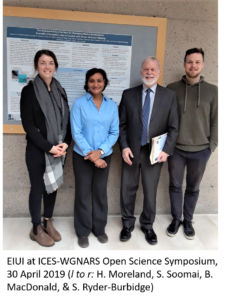EIUI team members frequently participate in research events about the science-policy interface. For example, Ian Stewart recently continued his work on science policy issues related to impact assessments by contributing to recent symposia/workshops. He attended “Cumulative Effects Assessment and Marine Shipping Activities: A Technical Workshop” hosted by Transport Canada under the Ocean Protection Plan on 20-21 February 2019 in Ottawa. Scholars from across Canada working in the impact assessment and/or shipping sectors were invited to join federal department scientists and policy experts, along with representatives from industry and coastal communities (Indigenous and non-Indigenous) at the workshop. This meeting was a step in Canada’s development of a national (but regionally sensitive) framework for assessing impacts of shipping. The workshop involved a combination of highly technical treatments of cumulative assessment techniques and methodologies and the challenges of applying them to shipping contexts. Ian is one of several Environmental Assessment scholars invited to contribute input on the ongoing development of the framework.
Ian also attended a second workshop in Ottawa, “Working with Co-production: A STS Methods Workshop,” hosted by Dr. Kelly Bronson, Canada Research Chair Science and Society, University of Ottawa on 31 March 2019. Canadian scholars working in the field of Science and Technology Studies (STS) presented papers reflecting on how the methodologies developed by Professor Sheila Jasanoff, Pforzheimer Professor of Science and Technology Studies, Harvard University, can be implemented in the Canadian context. “Co-production” refers to a general set of insights developed over the last few decades by Jasanoff and other STS scholars internationally that help to understand how scientific knowledge emerges simultaneously and reciprocally with socio-political systems that both make possible and constrain that science. This subject is a theoretical and practical set of approaches to questions central to EIUI’s research. Ian presented a paper entitled, “Environmental Assessment and Co-Production.”
 Several EIUI team members presented the poster “The Science-Policy Interface for Managing Marine Ecosystems: Scientific Information Use in Coastal and Ocean Decision-Making,” at the Open Science Symposium hosted by the ICES Working Group on the Northwest Atlantic Regional Sea (WGNARS) held at the Bedford Institute of Oceanography in Halifax on 30 April 2019. Ian Stewart participated in the WGNARS meetings, which were roundtable discussions of issues emerging from the symposium and previous WGNARS work on integrated ecosystem assessment. The discussions and break out sessions focussed on challenges of complex modelling techniques for ecosystem-wide assessment of fisheries activity, challenges of integrating socio-economic perspectives (and social sciences generally) in ecosystem assessment, and the implications of the Canada Department of Fisheries and Oceans state of the oceans report, Canada’s Oceans Now: Atlantic Ecosystems 2018 (see an EIUI post about this report at this link).
Several EIUI team members presented the poster “The Science-Policy Interface for Managing Marine Ecosystems: Scientific Information Use in Coastal and Ocean Decision-Making,” at the Open Science Symposium hosted by the ICES Working Group on the Northwest Atlantic Regional Sea (WGNARS) held at the Bedford Institute of Oceanography in Halifax on 30 April 2019. Ian Stewart participated in the WGNARS meetings, which were roundtable discussions of issues emerging from the symposium and previous WGNARS work on integrated ecosystem assessment. The discussions and break out sessions focussed on challenges of complex modelling techniques for ecosystem-wide assessment of fisheries activity, challenges of integrating socio-economic perspectives (and social sciences generally) in ecosystem assessment, and the implications of the Canada Department of Fisheries and Oceans state of the oceans report, Canada’s Oceans Now: Atlantic Ecosystems 2018 (see an EIUI post about this report at this link).
References
MacDonald, B. H., Soomai, S. S., Wells, P. G., Ross, J. D., Wilson, L., Cadman, R., Castillo, D., Martin, C., & Ryder-Burbidge, S. (2019). The science-policy interface for managing marine ecosystems: Scientific information use in coastal and ocean decision-making. Poster presented to the ICES Working Group for the North Atlantic Regional Seas (WGNARS) Open Science Symposium, Bedford Institute of Oceanography, Halifax, Nova Scotia, 30 April 2019.
Stewart, I. (2019). Environmental assessment and co-production. Paper presented to Working with Co-production: A STS Methods Workshop, University of Ottawa, Ottawa, 31 March 2019.